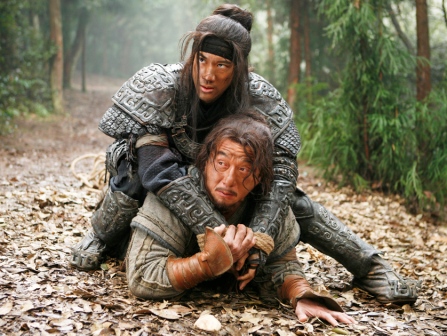January 15th, 2011
Little Bitty Jackie Chan

“Err…it’s not what it looks like.” — Leehom Wang and Jackie Chan in Little Big Soldier.
For quite a while now, Jackie Chan has seemed pretty cognizant of the need to re-invent himself as an actor in order to stay relevant to a contemporary audience. He’s made it clear in interviews that he knows he’s getting older, and he can’t keep (and hasn’t kept) playing the young romantic lead doing the same death-defying stunts with any degree of believability. Over the years, Chan has made several attempts at reinvention as a dramatic actor, but he’s always reverted back to the comfortable “Jackie Chan-type” character in Hong Kong and American films. More recently, he’s tried to walk on the dark side as reluctant crime lord in The Shinjuku Incident and tried to act his age as the Sifu in the recent remake of The Karate Kid. But in my view, the most successful attempt at reinvigorating Chan’s career was 2010’s Little Big Soldier.
While Jackie playing the aged mentor in The Karate Kid seems like a natural progression for Chan and his role in The Shinjuku Incident seemed like an admirable attempt to show some range, Little Big Soldier offers Chan the perfect vehicle for the actor, as it retains what we like about Chan as an entertainer, but filters that through a character who is not at all interchangeable with the happy-go-lucky good guys of Rumble in the Bronx and Mr. Nice Guy. Unlike Shinjuku Incident, where Chan’s hero image conflicts with what the movie is telling us about his character, Little Big Soldier gives us a character we can invest in completely, who can surprise us, and who has a level of backstory that few Chan characters possess. What’s even better is that the film is quite good, too.
The backdrop of the action occurs during China’s Warring States Period. Chan plays “The Old Soldier,” a farmer drafted into the Liang army who has been able to survive even the worst battles using his wits, cunning, and a nice helping of athleticism. What may seem like the Old Soldier’s out-and-out cowardice by someone with more patriotic leanings actually turns out to be pragmatic self-preservation, albeit with a much deeper and more sentimental purpose. Through a stroke of luck, the Old Soldier ends up capturing a Wei General (a very good Leehom Wang) and decides to take him back to Liang in order to receive a ransom for his efforts. Through a series of events, the Old Soldier learns that his quarry is no mere general, but the Crown Prince of Wei. Of course, the two very different characters end up butting heads throughout their journey, as they try to avoid attacks from all sides, especially the wrath of the Prince’s smarmy little brother (Steve Yoo), who has been encouraged by his top advisor to kill the Prince to replace him in the order of succession. Will the Old Soldier make it back to Liang with his prize in tow? Will the Prince escape or perhaps be set free? Or will one or both of our heroes end up dead? The answer might surprise you.
MILD SPOILERS AHEAD
The film’s ending might seem incongruous with everything that came before or at a least disappointing for an audience totally invested in the fates of its heroes, but I think the downbeat conclusion emphasizes the larger point that the film has been making every step of the way — that in times of war, it’s the “little people” who lose out. In that sense, Little Big Soldier seems like an anti-Hero – that is, it serves as a rejoinder to the “ends justify the means” sentiments put forth by the characters in Zhang Yimou’s popular 2002 film. While “All Under Heaven” might be an admirable goal, Little Big Soldier asks you to consider the costs
Little Big Soldier concludes on a sour note, leaving a few lines of onscreen text to suggest that the unification of China by the Qin State. But its inclusion of Prince Wei’s decision, the text reads as largely ironic. In other words, I don’t think Chinese audiences are supposed to well up with warm and fuzzy feelings about the end of the Warring States Period. So what if the Qin unified China? After all, who wiped out the Old Soldier’s home?
END OF MILD SPOILERS
Perhaps the filmmakers weren’t comfortable leaving you with that final thought, as the film includes a blooper reel to take the edge off. But in some ways, I think that might have been a good move in keeping with the spirit of the film. After all, Little Big Soldier never comes across as a self-important, “meaningful film,” but instead as an entertaining movie invested with real meaning. And in that respect, I think it succeeds. While country music singer Alan Jackson may claim it’s all right to be little bitty, Little Big Soldier suggests that they are the first people, not those in power, to suffer the real costs of war.
For a more detailed review of the film, check out Kozo’s take here.

